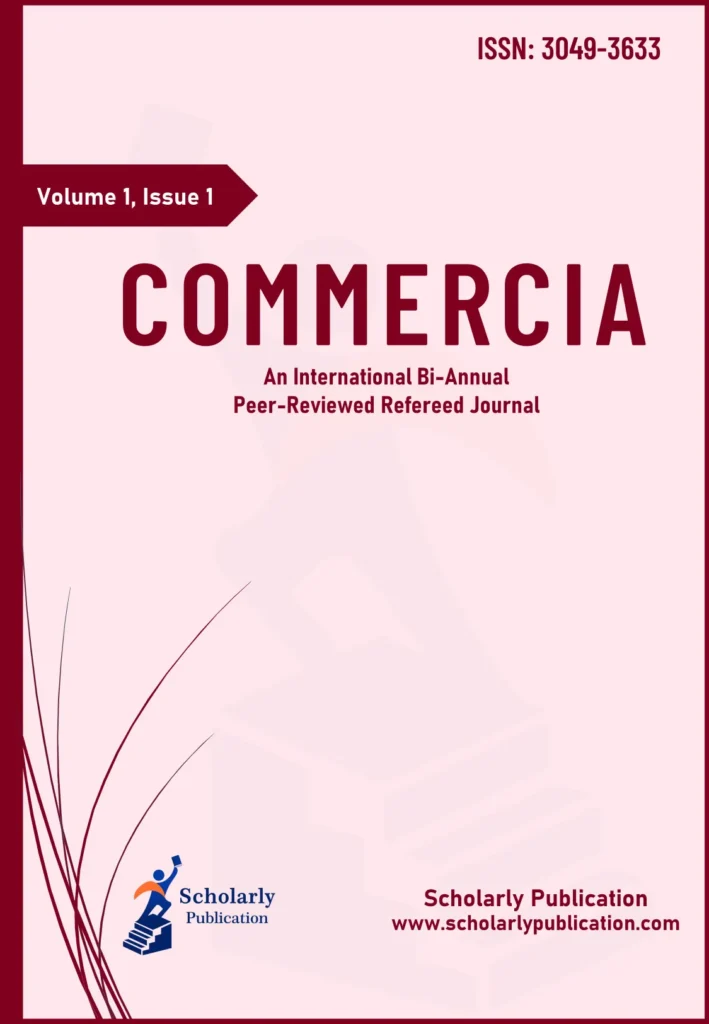How Employee Empowerment Influences Service Quality and Customer Satisfaction
Volume 1, Issue 1, Article Number: 251010 (2025)
Home >> Commercia >> Volume 1, Issue 1
1Research Scholar, School of Management, IIS (Deemed to be University), Jaipur – 302020, Rajasthan, India
2Professor, Department of Business Studies, IIS (Deemed to be University), Jaipur – 302020, Rajasthan, India
*Corresponding Author: sunitasharma4881@gmail.com
Received: 28 May 2025 | Revised: 04 June 2025
Accepted: 06 June 2025 | Published Online: 10 June 2025
DOI: https://doi.org/10.5281/zenodo.15628968
© 2025 The Authors, under a Creative Commons license, Published by Scholarly Publication
Abstract
The study explored the links among front desk staff empowerment; how satisfied customers are and the level of service. Questionnaires helped gather the required information from the respondents to meet the goal stated. Data was examined with multiple regression analysis. It was found that customer satisfaction did not show a significant relationship with employee empowerment. The findings suggested that relationship between the two factors was present but not proven by statistics. The research showed a clear and positive relationship between how well an organization serves its customers and how much authority employees have. There was a link found between staff empowerment and customer satisfaction, although it was not statistically significant. Customer satisfaction goes up when service quality is high. According to the results, the researchers encouraged the industry authorities to restructure their places to boost employees’ intrinsic drive to provide exceptional customer service, which could result in satisfied patrons. It was also suggested that front desk staff be urged to concentrate on the appropriate organizational structure and service culture that promote competence, influence, meaning, and self-determination.
Keywords
Customer satisfaction, Structural empowerment, Psychological empowerment, Employee empowerment
References
- Kassim, Z. A., Yusoff, I. Y. M., & Fong, N. L. (2012). Job Empowerment and Customer Orientation of Bank Employees in Kuching, Malaysia. Contemporary Management Research, 8, 131-140.
[View Article] [Google Scholar]
- Ahmed, H., & Rafiq, H. (2003). Marketing Principles and Perspectives (3rd ed.). New York: Mc Graw Hill.
- Alabar, T. T., & Abubakar, H. S. (2013). Impact of employee empowerment on service quality-an empirical analysis of the Nigerian banking industry. British Journal of Marketing Studies, 1, 32-40.
- Alabi, O. A., Ajayi, F. A., Udeh, C. A., & Efunniyi, C. P. (2024). Data-driven employee engagement: A pathway to superior customer service. World Journal of Advanced Research and Reviews, 23, 923–933.
[View Article] [Google Scholar]
- Ali, A. & Sumaira (2025). Assessment of Employee Empowerment and Organizational Commitment on Product and Marketing Innovation: A Pathway to Customer Retention in the FMCG Sector. Indian Journal of Natural Sciences, 15, 1-15.
- Ali, A., Soofi, A. H., Jadul, Jabbar, A., & Shahid, A. (2025). The Impact of Employee Empowerment and Job Satisfaction on Organizational Performance. The Critical Review of Social Sciences Studies, 3, 1918-1927.
[View Article] [Google Scholar]
- Arhin, E. P., & Cobblah, C. (2024). Total quality management implementation practices and customer satisfaction: the role of innovative employee behavior and employee empowerment. Management Research Quarterly, 1, 26-41.
[View Article] [Google Scholar]
- Ayupp, K., & Chung, T. H. (2010). Empowerment: Hotel employees’ perspective. Journal of Industrial Engineering and Management (JIEM), 3, 561-575.
- Bello, Y. O. (2012). Hospitality Economics (A Simplified Approach) in the Nigerian Hospitality Industry (2nd Ed.). Ondo: Grace Excellent Publishers.
- Bello, Y. O., & Bello, M. B. (2015). Lodging Service Management and Administration (Theory and Practice. Benin: Diamond Publishing House.
- Churchill Jr, G. A., & Surprenant, C. (1982). An investigation into the determinants of customer satisfaction. Journal of Marketing Research, 19, 491–504.
[View Article] [Google Scholar]
- Conger, J. A., & Kanungo, R. N. (1988). The empowerment process: Integrating theory and practice. Academy of Management Review, 13, 471-482.
[View Article] [Google Scholar]
- Gist, M. E., & Mitchell, T. R. (1992). Self-efficacy: A theoretical analysis of its determinants and malleability. Academy of Management Review, 17, 183-211.
[View Article] [Google Scholar]
- Grönroos, C. (1988). New competition in the service economy: The five rules of service. International Journal of Operations & Production Management, 8, 9-19.
[View Article] [Google Scholar]
- Hocutt, M. A., & Stone, T. H. (1998). The impact of employee empowerment on the quality of a service recovery effort. Journal of Quality Management, 3, 117-132.
[View Article] [Google Scholar]
- Igbojekwe, P. (2002). Skill and Techniques of Food and Beverage Service. In C. I. Okoli, Food and Beverage Service Operations in the Hospitality Industry. Owerri: Webs Media Communication.
- Kanter, R. (1993). Men and Women of the Corporation (2nd ed.). New York: Basic Books
- Kim, L., & Yeo, S. F. (2024). How stress and satisfaction influence customer service quality in banking industry. Heliyon, 10, e32604.
[View Article] [Google Scholar]
- King, J. H., and Cichy, R. F. (2006). Managing for Quality in the Hospitality Industry. Upper Saddle River, New Jersey: Pearson Education, Inc.
- Lee, Y. K., Nam, J. H., Park, D. H., & Ah Lee, K. (2006). What factors influence customer‐oriented prosocial behavior of customer‐contact employees?. Journal of Services Marketing, 20, 251-264.
[View Article] [Google Scholar]
- Nikki, F., Pietro, C., Sunet, L., Basheena, B., Osere, A., Nicolas, V, & Michael, M. (2015). The African Traveller. Sunninghill, South Africa: PWC’S Hospitality Industry Group.
- Özkan, P., Süer, S., Keser, İ. K., & Kocakoç, İ. D. (2020). The effect of service quality and customer satisfaction on customer loyalty: The mediation of perceived value of services, corporate image, and corporate reputation. International Journal of Bank Marketing.
[View Article] [Google Scholar]
- Palmer, A. (2001). Principles of Services Marketing (3rd ed.). Berkshire: McGraw-Hill.
- (2015). Hospitality Outlook; 2015-2019. South Africa: PCWC.
- Spiro, R. L., & Weitz, B. A. (1990). Adaptive selling: Conceptualization, measurement, and nomological validity. Journal of Marketing Research, 27, 61-69
[View Article] [Google Scholar]
- Sugiono, E., & Alfaraby, A. (2025). The Effect of Employee Empowerment and Policy Implementation on The Quality of Public Services with Job Satisfaction as An Intervening Variable at The Indonesian Quarantine Agency. International Journal of Management Science and Information Technology, 5, 151-159.
[View Article] [Google Scholar]
- Tabachnick, B. G., & Fidell, L. S. (2007). Using multivariate statistics, 5th ed. New York. NY: Allyn and Bacon.
- Yang, S. B., & Choi, S. O. (2009). Employee Empowerment and Team Performance: Autonomy, Responsibility, Information and Creativity. Journal of Team Perform Management, 15, 289-30.
[View Article] [Google Scholar]
- Zeglat, D., Aljaber, M., & Alrawabdeh, W. (2014). Understanding the Impact of Employees Empowerment on Customers Satisfaction. Journal of Business Studies Quarterly, 6, 1-13.
Cite This Article
S. Sharma and R. Jain, “How Employee Empowerment Influences Service Quality and Customer Satisfaction,” Commercia 1(1) (2025) 251010. https://doi.org/10.5281/zenodo.15628968
Rights & Permission
This is an open access article published under the Creative Commons Attribution (CC BY) International License, which allows unrestricted use, distribution, and reproduction in any medium, provided the original work is properly cited. No permission is needed to reuse this content under the terms of the license.
For uses not covered above, please contact the Scholarly Publication Rights Department.

